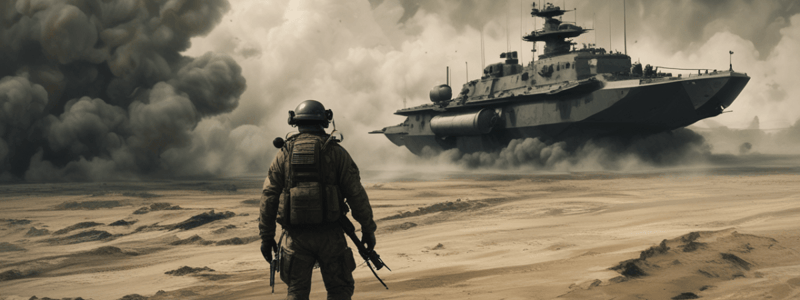Podcast
Questions and Answers
What was Admiral Sharp's suggestion for dealing with the Viet Cong during the Tet Offensive?
What was Admiral Sharp's suggestion for dealing with the Viet Cong during the Tet Offensive?
- Employing nuclear weapons to quickly overpower the enemy
- Developing and using non-lethal incapacitating weapons to minimize civilian casualties (correct)
- Withdrawing troops from urban areas to avoid civilian casualties
- Using lethal chemical weapons to maximize enemy casualties
What was Westmoreland's response to Admiral Sharp's suggestion?
What was Westmoreland's response to Admiral Sharp's suggestion?
- He agreed with the idea and suggested exploring new weapons development
- He recommended using standard chemical incapacitating agents, such as BZ (correct)
- He rejected the idea of using non-lethal incapacitating weapons
- He proposed only using biological agents, such as UC, for aerial spray
What was a major concern for Admiral Sharp regarding the use of chemical munitions?
What was a major concern for Admiral Sharp regarding the use of chemical munitions?
- The political implications and public distaste (correct)
- The potential environmental impact
- The risk of friendly fire casualties
- The potential for the enemy to develop similar weapons
What was the context of the discussion between Admiral Sharp and Westmoreland?
What was the context of the discussion between Admiral Sharp and Westmoreland?
What was the military advantage that Admiral Sharp saw in using non-lethal incapacitating weapons?
What was the military advantage that Admiral Sharp saw in using non-lethal incapacitating weapons?
What was the concern regarding the use of chemical incapacitants in warfare?
What was the concern regarding the use of chemical incapacitants in warfare?
What was the primary route of absorption for the chemical incapacitant BZ?
What was the primary route of absorption for the chemical incapacitant BZ?
Why did the US have a stockpile of lethal chemical weapons, including sarin and VX?
Why did the US have a stockpile of lethal chemical weapons, including sarin and VX?
What was the limitation of the US's capability to wage chemical warfare?
What was the limitation of the US's capability to wage chemical warfare?
What was the outcome of the US's production and stockpiling of lethal chemical weapons?
What was the outcome of the US's production and stockpiling of lethal chemical weapons?
What was the purpose of the US's development of various munitions for chemical warfare?
What was the purpose of the US's development of various munitions for chemical warfare?
What was the primary purpose of the incapacitating non-lethal antipersonnel chemical agents used in Vietnam?
What was the primary purpose of the incapacitating non-lethal antipersonnel chemical agents used in Vietnam?
What is the key claim of structural realism in the context of the use of CBN weapons in Vietnam?
What is the key claim of structural realism in the context of the use of CBN weapons in Vietnam?
Which of the following best explains the non-use of nuclear weapons by the US in Vietnam?
Which of the following best explains the non-use of nuclear weapons by the US in Vietnam?
What was the primary purpose of using CS, a chemical agent used by the US in Vietnam?
What was the primary purpose of using CS, a chemical agent used by the US in Vietnam?
What is the significance of crossing the nuclear threshold, according to Herman Kahn?
What is the significance of crossing the nuclear threshold, according to Herman Kahn?
What was the concern regarding the use of nuclear weapons in the Vietnam War, as outlined in the 'Political Consequences' scenario?
What was the concern regarding the use of nuclear weapons in the Vietnam War, as outlined in the 'Political Consequences' scenario?
What was the primary concern of the authors of 'Political Consequences' regarding the use of tactical nuclear weapons in Vietnam?
What was the primary concern of the authors of 'Political Consequences' regarding the use of tactical nuclear weapons in Vietnam?
What is the central argument of the 'Nuclear Taboo' in the context of the Cold War?
What is the central argument of the 'Nuclear Taboo' in the context of the Cold War?
What is the fundamental problem with using nuclear weapons in a limited war, as outlined in the ' Political Consequences' scenario?
What is the fundamental problem with using nuclear weapons in a limited war, as outlined in the ' Political Consequences' scenario?
What is the significance of the 'Nuclear Taboo' in the context of nuclear proliferation?
What is the significance of the 'Nuclear Taboo' in the context of nuclear proliferation?
What role did world public opinion play in shaping the US's decision not to use nuclear weapons in the Vietnam War?
What role did world public opinion play in shaping the US's decision not to use nuclear weapons in the Vietnam War?
What was President Johnson's stance on the use of nuclear weapons in the Vietnam War?
What was President Johnson's stance on the use of nuclear weapons in the Vietnam War?
How did the concept of a nuclear taboo influence the US's decision-making during the Vietnam War?
How did the concept of a nuclear taboo influence the US's decision-making during the Vietnam War?
What was the significance of the views of foreign leaders, such as U Thant and Harold Wilson, in the context of the US's non-use of nuclear weapons in Vietnam?
What was the significance of the views of foreign leaders, such as U Thant and Harold Wilson, in the context of the US's non-use of nuclear weapons in Vietnam?
How did the US's experience in the Vietnam War reflect the principles of limited war theory?
How did the US's experience in the Vietnam War reflect the principles of limited war theory?
What does the US's non-use of nuclear weapons in Vietnam suggest about the effectiveness of nuclear deterrence during the Cold War?
What does the US's non-use of nuclear weapons in Vietnam suggest about the effectiveness of nuclear deterrence during the Cold War?
What was the main reason behind Rusk's willingness to take the risk of major escalation in Vietnam, according to the text?
What was the main reason behind Rusk's willingness to take the risk of major escalation in Vietnam, according to the text?
How did Rusk propose to respond to an attack on South Korea, according to the text?
How did Rusk propose to respond to an attack on South Korea, according to the text?
What was the context of Rusk's suggestion to move a US division in Korea to Southeast Asia, according to the text?
What was the context of Rusk's suggestion to move a US division in Korea to Southeast Asia, according to the text?
How did Rusk's views on nuclear weapons differ from Eisenhower's, according to the text?
How did Rusk's views on nuclear weapons differ from Eisenhower's, according to the text?
What was the underlying assumption behind Rusk's willingness to take risks in Vietnam, according to the text?
What was the underlying assumption behind Rusk's willingness to take risks in Vietnam, according to the text?
What was the significance of Rusk's memo to President Kennedy, according to the text?
What was the significance of Rusk's memo to President Kennedy, according to the text?
Flashcards are hidden until you start studying





